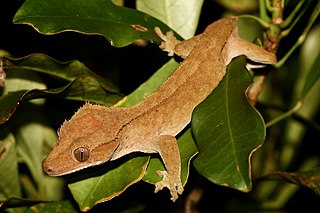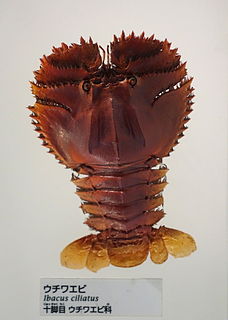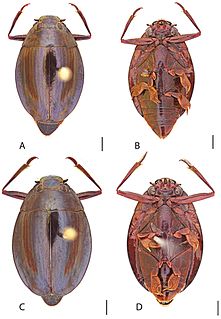Related Research Articles

The goatfishes are perciform fish of the family Mullidae. The family is also sometimes referred to as the red mullets, which also refers more narrowly to the genus Mullus.

The crested gecko or eyelash gecko is a species of gecko native to southern New Caledonia. In 1866, the crested gecko was described by a French zoologist named Alphonse Guichenot. This species was thought extinct until it was rediscovered in 1994 during an expedition led by Robert Seipp. Along with several other New Caledonian gecko species, it is being considered for protected status by the Convention on the International Trade in Endangered Species of Wild Flora and Fauna.

Bromus is a large genus of grasses, classified in its own tribe Bromeae. They are commonly known as bromes, brome grasses, cheat grasses or chess grasses. Estimates in the scientific literature of the number of species have ranged from 100 to 400, but plant taxonomists currently recognize around 160–170 species.
Nosferattus ciliatus is a jumping spider.

Leopoldamys is a genus of rodents in the family Muridae endemic to Southeast Asia. It contains the following species:
Lanistes ciliatus is a species of large freshwater snail, an aquatic gastropod mollusk with a gill and an operculum in the family Ampullariidae, the apple snails.
Lasianthus ciliatus is a species of plant in the family Rubiaceae. It is endemic to Tamil Nadu in India.

Bromus ciliatus is a species of brome grass known by the common name fringed brome. It is native to most of North America, including most of Canada, most of the United States except for some portions of the South, and northern Mexico. It is a plant of many habitats, including temperate coniferous forest. The specific epithet ciliatus is Latin for "ciliate", referring to the delicate hairs of the leaf blades.

Leptosiphon ciliatus is a species of flowering plant in the phlox family known by the common name whiskerbrush.

Ibacus ciliatus is a species of slipper lobster from the north-west Pacific Ocean.
The Sundaic mountain leopoldamys is a species of rodent from the family Muridae. It was formerly considered a subspecies of Edwards's long-tailed giant rat, and it has one synonym: Leopoldamys setiger.
Mecynippus is a genus of longhorn beetles of the subfamily Lamiinae, containing the following species:

Monacanthus ciliatus, commonly known as the fringed filefish, the cuckold or the leather-fish, is a species of bony fish commonly found in shallow water in the western Atlantic Ocean, the Caribbean Sea and the Gulf of Mexico.

Polyporus ciliatus is a species of fungus in the genus Polyporus.

Dineutus ciliatus is a species of whirligig beetle in the family Gyrinidae. It is found in North America.

Amphicrossus ciliatus is a species of sap-feeding beetle in the family Nitidulidae. It is found in the Caribbean Sea, Central America, and North America.
Xerosaprinus ciliatus is a species of clown beetle in the family Histeridae. It is found in Central America and North America.
Cyrtomenus ciliatus is a species of burrowing bug in the family Cydnidae. It is found in North America.

Sebastes ciliatus, the dusky rockfish, is a species of marine ray-finned fish belonging to the subfamily Sebastinae, the rockfishes, part of the family Scorpaenidae. It is typically found in the North Pacific Ocean, specifically in the Bering Sea near British Columbia, in the Gulf of Alaska, and in the depths of the Aleutian Islands.

Plectranthus ciliatus, called Indian borage, speckled spur flower, blue spur flower, and candlestick plant, is a species of flowering plant in the family Lamiaceae. It is native to South Africa and Swaziland, and introduced to Victoria in Australia and the North and South Islands of New Zealand. With its Coleus‑like foliage, its cultivar 'Easy Gold' has gained the Royal Horticultural Society's Award of Garden Merit as an ornamental.
References
- ↑ BioLib.cz - Mecynippus ciliatus. Retrieved on 8 September 2014.